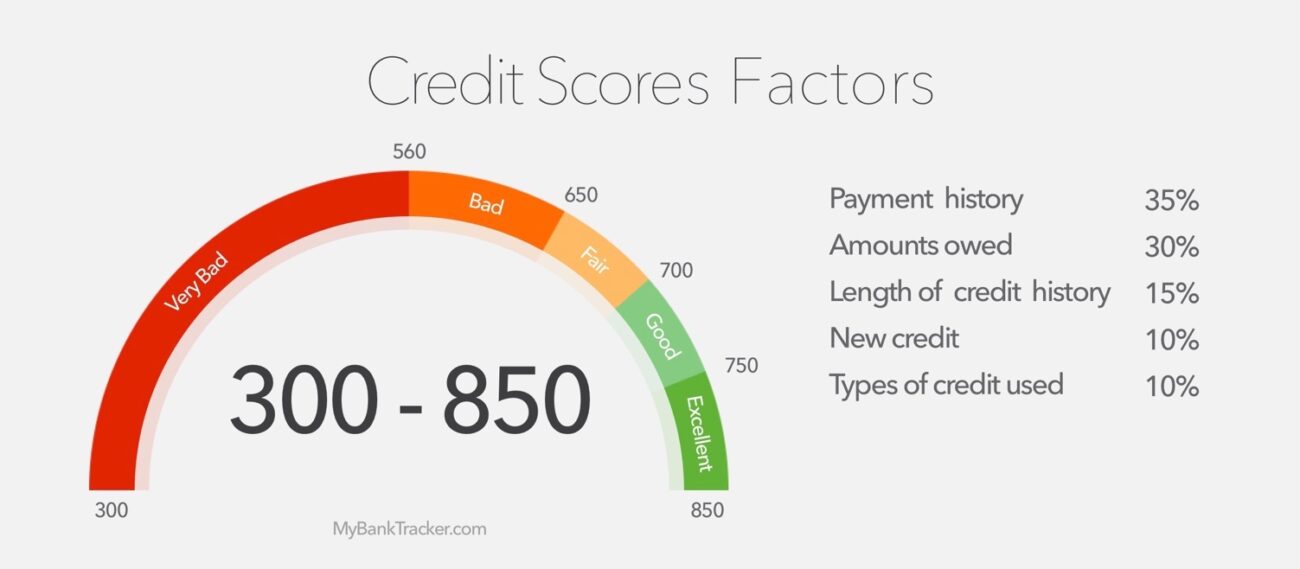


A credit score, usually ranging from 300 to 850, is a numerical representation of an individual’s or business’s ability to repay loans. A high score (700-850) indicates timely bill payments, while a score below 600 suggests a higher risk of default. Credit scores, crucial for various financial transactions, are included in credit reports that also contain personal and financial details. Lenders, creditors, landlords, and employers use these scores for decision-making. Credit bureaus like CRC Credit Bureau, First Registry, and CreditCentral Nigeria calculate scores using factors such as payment history, credit limit, utilization, debts, length of credit history, account types, and new credit applications.
Have you ever wondered how credit providers like lenders, banks and other institutions can make decisions concerning credit applications with just a few details?
How can they tell who is trustworthy enough and who is not?
They use something you may not have heard of, called credit scores to quickly make those decisions.
One glance at the credit score of individuals or businesses and credit providers can quickly understand the risk they will be taking if they give out credit, or if they should even give out credit at all.
This is why it is very important to understand what a credit score is, how the credit scoring process works, how to check credit scores, what credit bureaus are, and how to improve or maintain credit scores.
A credit score is a number, usually between 300 and 850, that tells lenders how individuals and business handle loan repayment.
It is a representation of creditworthiness, and a good score (typically 700 – 850) shows that individuals and businesses pay bills on time while a bad score (below 600) shows that they do not and that lenders should be weary of providing them credit since they are most likely to default.
A credit score is almost always included in a credit report. This report also contains:
Lenders are not the only ones that make use of credit scores. Creditors, landlords, employers, and all authorized financial institutions registered with the credit bureau can use credit scores to determine if they will grant loans, credit cards, or credit facilities in general.
Since credit scores are very important, especially to individuals who utilize credit and businesses, it is very important to occasionally check the credit scores to confirm that they are accurate and to identify areas that need to be worked on to improve the score, or to determine if any fraudulent activities are being carried on their accounts.
To know more about how to check your credit score, go here.
If you already know how to check your credit score, and you want to understand in-depth how the scoring process works, go here.
If you, however, would like to know all the ways you can use to improve your credit score, go here.
Credit scores are calculated by credit bureaus through algorithms (computer programs that have been instructed to perform specific programs) that analyse the credit history of individuals and businesses through credit reports.

A credit bureau is an organization that collects and collates credit information on individuals and businesses with the main purpose of creating credit reports.
The three major credit reporting agencies in Nigeria CRC Credit Bureau, First Registry, CreditCentral Nigeria. These bureaus use the generally accepted FICO model for credit scores.
FICO scores range from 300 to 850 and have certain factors that will determine the score of individuals or businesses. These factors include:
Payment history refers to the data gathered on how you repay the lines of credit that you obtain. If you want a high credit score, you must have a spotless payment history. This means that all your bills must be paid on time and your loans must be repaid as and when due. A single late payment can hurt your credit score very badly.
This is the maximum amount that you can spend on all your lines of credit available in the report.
This is a measure of all the money you owe on all the available accounts measured.
This is your debt-to-credit limit ratio. It is determined by dividing how much you owe by your credit limit and is usually a very important factor in the credit scoring process. To have a healthy score, you must make sure to lower your credit utilization, to the tune of single digits.
If you are not able to use credit responsibly, it will negatively affect your score.
The length of your credit history, also known as the age of your credit history, is a vital factor in the scoring process as individuals or businesses with accounts that are old have better scores than newer accounts with the same parameters.
The credit score scoring process involves all accounts that you have that the credit bureaus are aware of. This means that you must maintain accounts that can be easily tracked so that their performances can be added to your scores. Accounts include credit cards obtained and lines of credit, types of credit, revolving credit accounts, loans obtained etc.
This is determined by the frequency at which you obtain new lines of credit. As a general rule, only take new lines of credit when you need it and when you are sure that you can conveniently repay it. Whenever you apply for a new line of credit, an enquiry is made on your credit report. Too many enquiries in a short space of time will negatively impact your credit score.
Understanding all of the above factors and working on them can help you significantly improve your credit score. To know more, go here.
Maintaining a good score, or improving on a bad score is vital if you wish to conveniently access credit facilities and make better financial decisions in the future.
To improve your credit score, you must:
Payment history is a major factor in credit scores, no matter the credit bureau. It is important to make sure all bills are paid on time as one late payment can severely hurt your scores.
Your credit history might show that you have always been paying your bills one time, but one default can bring down the score by a large number.
This also depends on how late the payment is and how often you make subsequent late payments in the future, no matter the reason for the default, so it’s best to take repayments seriously.
Your credit card bills, loans, utilities, and other bills are reported to credit bureaus, so any late payments or missed payments will affect your credit scores.
To avoid late payments, it is advisable to set up automatic payments of your bills on your accounts so your repayments are always up to date. This saves you the headache of having to remember (or setting multiple reminders) the due dates on all your bills, and repayment of loans.
This method requires your account to be duly funded and even if the funds in your account are not up to be bills that need to be paid, you will receive notifications.
Other ways to avoid late repayments include:
Credit utilization is the amount of an individual’s or business’s available credit that is being used.
Your utilization should be kept as low as possible as this is another important factor in credit scores.
If your credit utilization is high, and your debt is also high, your credit scores can never be healthy. It is therefore advisable to only use credit when you need it to help you improve your scores over time.
Ways to keep your credit utilization low include:
If your credit utilization is already very high, you need to consider employing many or all of the solutions listed above to reduce your credit utilization or manage it as you cannot simply wipe it and start all over again.
When you check your credit score, or when organizations check your credit score for reasons other than granting you a new line of credit, it is called a soft check/inquiry and you are allowed, and even encouraged to check your score as much as possible to stay in control of your credit history.
Soft checks include:
When lenders and creditors check your score to make a decision on credit facilities concerning you, because you’ve applied for new credit, it is called a hard check/inquiry.
Hard checks include:
Hard checks/inquiries take points off your credit score. These points are insignificant individually, but too many could significantly damage your scores.
This is one of the reasons applying for too much new credit at once can be a bad idea.
Another reason to applications for too much credit can hurt your scores is that is seen as a sign of financial instability and desperation. It is better to space out credit applications over time as opposed to applying for multiple forms at the same time.
Errors can appear on your credit report at any point. Just because you’ve disputed errors at some point concerning your credit history does mean no more errors will pop up.
This is why it is always best to closely monitor your credit file to discover and dispute innocent errors through misinformation, or malicious errors that arise from fraudulent activities.
Credit bureaus have a process in place for disputing errors on credit reports, and it’s important to follow this process to ensure that errors are corrected.
Some tools can be used to improve your credit scores such as secured credit cards and credit-builder loans which help individuals and businesses build or improve their credit scores.
Secured credit cards require a security deposit, which is used as collateral in case the individual or business is unable to make payments. This lowers the risk credit card companies take when giving people with low credit scores credit cards.
If you take a secured credit card, and you manage it well by making repayments on time and keeping your credit utilization low, your credit score will increase and the credit card company might consider awarding you an unsecured credit card.
Credit-builder loans are small loans that are designed specifically for building or improving credit scores. Instead of the traditional loan process where you take the money and pay it back in instalments over time, you instead make payments to a lender and get the loan amount after you’ve completed the fixed payments at the end of the loan term.
Credit scores are important indicators of financial risk and are used by many financial institutions to make decisions about loans, credit cards, and other forms of credit.
Credit scores are based on credit history and are calculated by credit reporting agencies. Individuals and businesses can take steps to improve their credit scores once they understand the factors that affect the credit scoring process works.
This will over time grant them access to more credit-building facilities from creditors and financial institutions as well as favourable associations with new employers and new landlords who also use credit scores to make decisions in Nigeria.
₦10,000 Loan ● ₦20,000 Loan ● ₦30,000 Loan ● ₦40,000 Loan ● ₦50,000 Loan ● ₦100,000 Loan ● ₦200,000 Loan ● ₦300,000 Loan ● ₦500,000 Loan ● ₦1 Million Loan ● ₦3 Million Loan ● ₦5 Million Loan ● ₦6 Million Loan
● Online Loan ● Emergency Loan ● Payday Loan ● Debt Consolidation ● ● Rent Loan ● Travel Loan